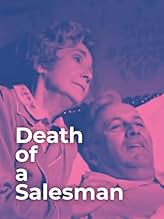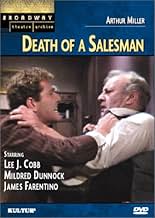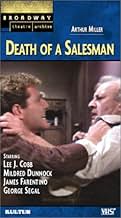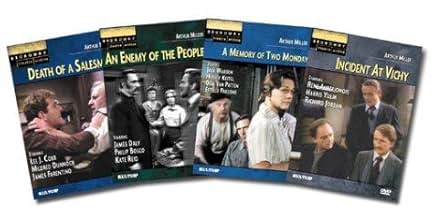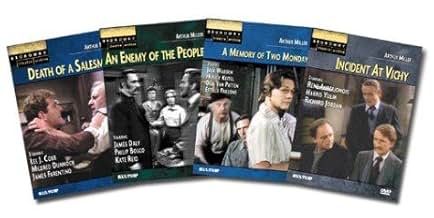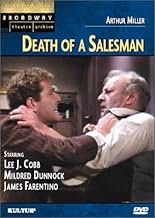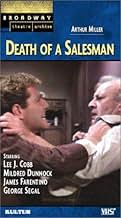Aggiungi una trama nella tua linguaAn abridged award-winning television adaptation of a famous play about an aging travelling salesman who's on the verge of a nervous breakdown. His job is gone, and his family hates him for n... Leggi tuttoAn abridged award-winning television adaptation of a famous play about an aging travelling salesman who's on the verge of a nervous breakdown. His job is gone, and his family hates him for never being there. He tries mending things with them.An abridged award-winning television adaptation of a famous play about an aging travelling salesman who's on the verge of a nervous breakdown. His job is gone, and his family hates him for never being there. He tries mending things with them.
- Regia
- Sceneggiatura
- Star
- Vincitore di 3 Primetime Emmy
- 5 vittorie e 8 candidature totali
Marc Fiorini
- Stanley
- (non citato nei titoli originali)
Recensioni in evidenza
Just got this from Broadway Theatre Archive. I would recommend this to anyone remotely interested in this play and the history of American theater. While not the "film" the Dustin Hoffman version is, I found it more moving. It preserves two great performances, the original ones on Broadway. Lee J. Cobb is amazing. More than any other performance of this I've seen, he successfully shows Willy's horrifying diminishment in mental capacity while losing none of his character's or the play's emotional power. Mildred Dunnock is softer toward Willy than her successors but shows the steel within her when she deals with her sons. All in all a heartbreaking performance.
George Segal is good as Biff, but unlike the more evenly balanced Dustin Hoffman-John Malkovich version, is somewhat dwarfed by Lee J. Cobb's Willy. James Farentino, who made a superb Biff on Broadway with George C. Scott, makes a superb Hap.
George Segal is good as Biff, but unlike the more evenly balanced Dustin Hoffman-John Malkovich version, is somewhat dwarfed by Lee J. Cobb's Willy. James Farentino, who made a superb Biff on Broadway with George C. Scott, makes a superb Hap.
Willy Loman never realises until the end that he is a loser. Although his son Biff knows he himself is a loser, his father won't accept this. Son, Hap, like his father doesn't know he is a loser, either. Miller seems obliquely to imply that society is to blame for Willy's sad life. Maybe so, surely society doesn't cut him much slack, especially as represented by the son of his long time firm, for which he has been a fairly successful salesman much of his life. Whatever one's opinion on this subject, the play certainly portrays very genuine emotions and problems as the aging Willy more and more loses contact with reality and harkens back to nodal points in his life, especially contacts with his successful brother Ben. Or is Ben just a figment of his imagination. We can only guess. At the final funeral scene, Hap's losing philosophy continues. Could he and Biff take Willy's $20,000 insurance award and make it as ranching partners out west? We'll never know; Hap is determined to "make it big" in the Big Apple. Fat chance!
A better cast would be hard to imagine and the stage setting is beautifully photographed. The "fantasy" scenes are smoothly integrated with bits of "movie magic" that emulate what would be accomplished in the theatre with tricks of lighting. Cuts from the complete play are minor. This was TV at its best.
A better cast would be hard to imagine and the stage setting is beautifully photographed. The "fantasy" scenes are smoothly integrated with bits of "movie magic" that emulate what would be accomplished in the theatre with tricks of lighting. Cuts from the complete play are minor. This was TV at its best.
Arthur Miller's play is an American classic, timeless and poignant. I've seen three film/TV and one stage version of the play. Lee J. Cobb's performance is the most powerful and frightening, comparable to his earlier performance in "12 Angry Men". As far as the character of Willy Loman and the sales profession a recommended viewing of "Glengarry Glen Ross" would be enlightening.
The only slight reservation I have about this TV version of the play is the fact that it was clearly shortened for the medium. The greatest thing about this recording is that it preserves Lee J. Cobb's interpretation of the lead role. I was enrolled in a drama school in the early 60s, a time when several of our teachers had actually seen him in the 1947 stage play. They would frequently speak, in reverent tones, of the scorching great performance that Cobb delivered. This 1966 television revival makes Cobb seem all the more remarkable to me due to the nearly twenty year interval that had passed since the New York run of the play. No matter how great a performance he might have initially delivered, many an actor would have lost a lot of the original intensity in that span. On top of this, Cobb had experienced a battering ordeal at the hands of the House on Un-American Activities Committee toward the end of the run of the play. There is a fascinating story behind Cobb's development of the role. During rehearsals, the director was considering replacing Lee, as his work was not showing promise. The story goes that, at a critical point, Cobb had been staring at a crack in a wall in the rehearsal space. Suddenly he was seized by a strong sense of the character which immediately endowed his reading with uncanny feeling and intensity. Late in the run, it is told that the characterization took such a pervasive hold on the actor that he started to take it home with him, unable to snap out of it.
Clearly, "Death of a Salesman" is the best play that Arthur Miller has written. It is almost as if he wrote it with Lee J. Cobb in mind to play salesman Willy Loman. Lee J. Cobb (then 38 years old) had performed this role on Broadway starring in the original cast. The play ran for 742 performances from February 10, 1949 thru November 18, 1950.
I saw the television movie which ran on CBS television when it was broadcast in 1966. Back then we only had a black and white TV. Thirty-nine years later I purchased the DVD and marveled in seeing "Death of a Salesman" in color.
Sixteen years later a now 55 year old Cobb reprises his Broadway stage role for the television cameras and was emotionally and dramatically perfect. Cobb plays road salesman Willy Loman so well that the viewer can see him having an emotional breakdown as the play progresses to it's conclusion.
Part of the beauty of this television production is how it was video taped on a stage to resemble how an audience would see "Death of a Salesman" if it were being performed on the Broadway stage. The sets resembled those of a stage play. The only major difference is that, unseen by the viewers, the cameras were positioned to afford many dramatic angles and facial shots that could not be realized on a stage with a live audience.
The television movie co-stars Mildren Dunnock as Willy's wife Linda Loman. Ms. Dunnock was also in the original Broadway cast. Her dramatic and long suffering role as Willy's wife is played with emotion and genuine love for her salesman husband. I can never forget when she is scolding her adult sons for their lack of compassion to their father when she says, "....So attention must be paid. He's not to be allowed to fall into his grave like an old dog. Attention, attention must be paid to such a person."
George Segal turns in an excellent performance as Willy's son, Biff Loman, a son whom Willy had such dreams for Biff to be a college football star only to have a riff happen between Biff and his father. When Biff and Willy physically attack each other one can relate to real life when love covered over by hatred exists in real life families.
James Farentino plays the playboy son, Happy Loman who is a disappointment to Willy's dreams and his mother's respect for him. Farentino is well matched as Biff's brother and at times the two brothers reflect upon their youthful years when they were still in high school and the pride of their father's eye.
Gene Wilder (of Willy Wonka and Young Frankenstein fame) turns in a surprise performance at age 33 years old as Bernard the smart son of Willy's neighbor, Charley.
Veteran character actor Edward Andrews gives a fine performance as Charley. Maybe Charley is Willy's only true friend. Throughout the play, Charley tries shows genuine concern for Willy's predicament and tries to help him, to no avail, because Willy will not listen to Charley's wise counsel.
Albert Dekker plays Willy's older brother Ben. Ben is played as an hallucination. Ben's appears in Willy's mind dressed as a successful man who went away to make his fortune. Willy speaks to his brother as Hamlet spoke to his dead father and asks for Ben's advice on whether Willy has done right by his sons. Brother Ben's apparent success torments the mind of Willy.
Bernie Kopell plays Howard Wagner the heir and president of the Wagner Company that Willy has worked at for many years. Bernie Kopell went on to become well known as Dr. Adam Bricker in the TV series "The Love Boat" as well as being cast in many movies and TV series.
Character actor Stanley Adams has a small role as a waiter when Biff, Happy, and Willy meet for dinner. Up until his death in 1977 Stanley Adams appeared in roles in 65 motion pictures. Supporting roles were played by June Foray, Joan Patrick, Marge Redmond, and Karen Steele. At 88 years of age in 2005, June Foray continues to work in films doing cartoon voices. She is the voice of Rocky the Squirrel, Tweety Bird's Granny, and other various voices in 158 movie roles.
The dialogue written by Arthur Miller in Death of a Salesman is quite lengthy and difficult to perform by it's scope. Some passages delivered by Willy Loman comprise a whole page of dialogue. Biff, Happy, and Linda, likewise have dialogue segments of large paragraphs of speech.
I followed the TV play using the play script and did notice that some lines from the play script were omitted during the television production. Some lines were combined and rearranged for the benefit of keeping the camera on the speaker for continuity. Yet, in no way did this detract from the movement of the play.
Everyone who is a lover of good drama should find this DVD and enjoy what used to be the standard fare on television drama during the 1960s when great literary writings were presented to an appreciative audience much different than today's fast paced TV, remote control clicking audiences are now.
Death of a Salesman will keep you glued to your seat and you won't even think of going to the refrigerator for snacks. See this movie. It is a "10."
I saw the television movie which ran on CBS television when it was broadcast in 1966. Back then we only had a black and white TV. Thirty-nine years later I purchased the DVD and marveled in seeing "Death of a Salesman" in color.
Sixteen years later a now 55 year old Cobb reprises his Broadway stage role for the television cameras and was emotionally and dramatically perfect. Cobb plays road salesman Willy Loman so well that the viewer can see him having an emotional breakdown as the play progresses to it's conclusion.
Part of the beauty of this television production is how it was video taped on a stage to resemble how an audience would see "Death of a Salesman" if it were being performed on the Broadway stage. The sets resembled those of a stage play. The only major difference is that, unseen by the viewers, the cameras were positioned to afford many dramatic angles and facial shots that could not be realized on a stage with a live audience.
The television movie co-stars Mildren Dunnock as Willy's wife Linda Loman. Ms. Dunnock was also in the original Broadway cast. Her dramatic and long suffering role as Willy's wife is played with emotion and genuine love for her salesman husband. I can never forget when she is scolding her adult sons for their lack of compassion to their father when she says, "....So attention must be paid. He's not to be allowed to fall into his grave like an old dog. Attention, attention must be paid to such a person."
George Segal turns in an excellent performance as Willy's son, Biff Loman, a son whom Willy had such dreams for Biff to be a college football star only to have a riff happen between Biff and his father. When Biff and Willy physically attack each other one can relate to real life when love covered over by hatred exists in real life families.
James Farentino plays the playboy son, Happy Loman who is a disappointment to Willy's dreams and his mother's respect for him. Farentino is well matched as Biff's brother and at times the two brothers reflect upon their youthful years when they were still in high school and the pride of their father's eye.
Gene Wilder (of Willy Wonka and Young Frankenstein fame) turns in a surprise performance at age 33 years old as Bernard the smart son of Willy's neighbor, Charley.
Veteran character actor Edward Andrews gives a fine performance as Charley. Maybe Charley is Willy's only true friend. Throughout the play, Charley tries shows genuine concern for Willy's predicament and tries to help him, to no avail, because Willy will not listen to Charley's wise counsel.
Albert Dekker plays Willy's older brother Ben. Ben is played as an hallucination. Ben's appears in Willy's mind dressed as a successful man who went away to make his fortune. Willy speaks to his brother as Hamlet spoke to his dead father and asks for Ben's advice on whether Willy has done right by his sons. Brother Ben's apparent success torments the mind of Willy.
Bernie Kopell plays Howard Wagner the heir and president of the Wagner Company that Willy has worked at for many years. Bernie Kopell went on to become well known as Dr. Adam Bricker in the TV series "The Love Boat" as well as being cast in many movies and TV series.
Character actor Stanley Adams has a small role as a waiter when Biff, Happy, and Willy meet for dinner. Up until his death in 1977 Stanley Adams appeared in roles in 65 motion pictures. Supporting roles were played by June Foray, Joan Patrick, Marge Redmond, and Karen Steele. At 88 years of age in 2005, June Foray continues to work in films doing cartoon voices. She is the voice of Rocky the Squirrel, Tweety Bird's Granny, and other various voices in 158 movie roles.
The dialogue written by Arthur Miller in Death of a Salesman is quite lengthy and difficult to perform by it's scope. Some passages delivered by Willy Loman comprise a whole page of dialogue. Biff, Happy, and Linda, likewise have dialogue segments of large paragraphs of speech.
I followed the TV play using the play script and did notice that some lines from the play script were omitted during the television production. Some lines were combined and rearranged for the benefit of keeping the camera on the speaker for continuity. Yet, in no way did this detract from the movement of the play.
Everyone who is a lover of good drama should find this DVD and enjoy what used to be the standard fare on television drama during the 1960s when great literary writings were presented to an appreciative audience much different than today's fast paced TV, remote control clicking audiences are now.
Death of a Salesman will keep you glued to your seat and you won't even think of going to the refrigerator for snacks. See this movie. It is a "10."
Lo sapevi?
- QuizIn his autobiography "Timebends", Arthur Miller said that Lee J. Cobb was his favorite Willy Loman.
- ConnessioniFeatured in Role Model: Gene Wilder (2008)
I più visti
Accedi per valutare e creare un elenco di titoli salvati per ottenere consigli personalizzati
Dettagli
- Data di uscita
- Paese di origine
- Sito ufficiale
- Lingua
- Celebre anche come
- La muerte de un viajante
- Luoghi delle riprese
- Azienda produttrice
- Vedi altri crediti dell’azienda su IMDbPro
Contribuisci a questa pagina
Suggerisci una modifica o aggiungi i contenuti mancanti

Divario superiore
By what name was Death of a Salesman (1966) officially released in Canada in English?
Rispondi
